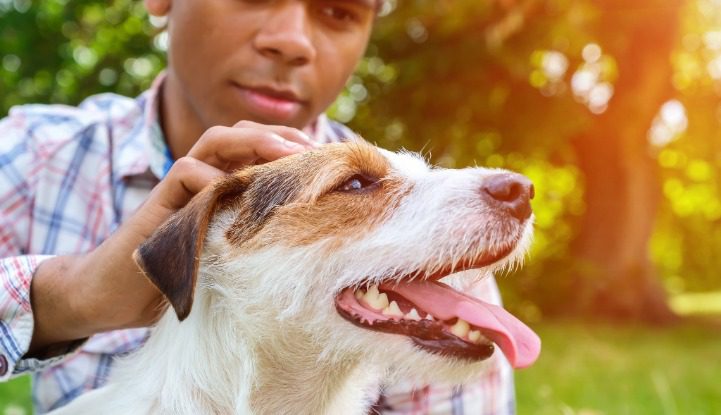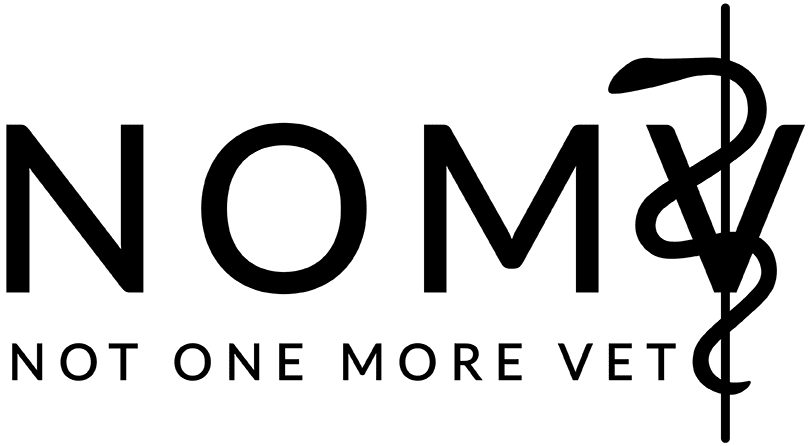Learning to Love After Loss
By Katie Lawlor, Psy.D., Director of NOMV’s VMHS
As companion animal parents, we have an extraordinary amount of love to give, and we often find so much of our identity and joy in this role. As a result, when they pass away, we can feel deeply lost, lonely, and scared that life will never be that wonderful again.
I do not believe we ever “move-on” after this loss; rather, in time, we can learn to live in a way that makes them proud of us. This can absolutely include bringing a new love into our home. To do this though, we first need to process our grief and manage whatever fears we have about loss.
Understandably, but unhelpfully, many of us attempt to cope with our thoughts and emotions of grief and fear by avoiding the scenarios that elicit them. Avoidance however prevents us from experiencing what we need to process, which gradually leads to us becoming numb. This avoidance tends to generalize over time into all aspects of our lives, until we find ourselves living a halfhearted, unfulfilling existence.

Coping Skills: How We Can Begin Overcoming Our Fear of Loss
Awareness. Before we can begin to overcome what scares us most, we must first name it. What are you most afraid of? Be as specific as possible. I ask this because our frightening thoughts and feelings can become so ingrained that we immediately accept them as true.
Coping Skill: We must remember that our thoughts and feelings are not facts, nor do they represent the inevitable happening.
Act. Our fears are just fears. They are created by our minds to make reality seem scarier than it is, in a misguided effort to “protect” us and keep us away, even from what we love.
Coping Skill: When we gather the courage to face our fears, and act despite of them, they begin to fade away. This also allows us to put our time and energy into what is most important in life.
Reframe. Whenever fear strikes, try to “reframe” it – think of it from a different viewpoint.
Coping Skill: Instead of picturing all the “bad things” that can happen in a scenario, think of something positive that could come out of it. Even better, what’s the best possible outcome if you acted despite your fear?
Ask. Our feelings are there to tell us something, so let’s ask what their purpose / function is.
Coping Skill: Ask your heart, your intuition, God, the universe, or whatever you feel comfortable with. What are your fears trying to tell you? What is the message they are trying to convey? Can we learn anything about ourselves by questioning them? Can we accept them with understanding and compassion toward ourselves, but refuse to let them dominate our lives and decisions?
Be Authentic. Remind yourself who you are at your core – an amazing, kind, generous pet parent who would move heaven and earth for your loved pets.
Coping Skill: Go to a quiet place, ask yourself the following questions, and answer them honestly. What would it look like to put the person you wanted to be out into the world? What would your life look like if you were not afraid to do what you want to do? What could you accomplish? Who could you become? Who would be better for this? What good could be done?
Speak with Those “Who Get It” / Have Been There Themselves. Those who have grieved the loss of their animal in the past want to support those now struggling with this heartbreak.
Coping Skill: How often do we hold our dark / scary / sad / painful feelings in because we are afraid of how others might react or think of us, especially our loved ones? When we are grieving, we need human connection, particularly validation regarding our devastation and the magnitude of our loss.
Understanding. A new animal can never replace the one who has passed, and this is actually the best realization. The love you shared with your animal who died created a bond that was truly incomparable. Death does not end this relationship, it never could. Their spirit is always with us, and live forever in our hearts.
Coping Skill: By acknowledging that a new animal will be an entirely separate being with his / her own personality, affection style, behaviors, quirks, mannerisms, and preferences, you can free yourself of any guilt you feel about loving again.
Opening Our Hearts
While they were alive, our animals loved us wholeheartedly and unconditionally. While they are no longer physically with us, they would want us to be happy, as they always were in our presence. For so many of us, this happiness includes the love of a pet. Indeed, when we open our hearts again, we are honor their lives while saving another.
Work Cited
Archer, J., & Winchester, G. (1994). Bereavement following death of a pet. British Journal of Psychology, 85(2), 259–271. https://doi.org/10.1111/j.2044-8295.1994.tb02523.x
Cordaro, M. (2012). Pet loss and disenfranchised grief: Implications for mental health counseling practice. Journal of Mental Health Counseling, 34(4), 283–294. https://doi.org/10.17744/mehc.34.4.41q0248450p77160
Field, N. P., Gavish, R., Orsini, L., & Packman, W. (2009). Role of attachment in response to pet loss. Death Studies, 33(4), 334–355. https://doi.org/10.1080/07481180802705783
Packman, W., Carmack, B. J., & Ronen, R. (2012). Therapeutic implications of continuing bonds expressions following the death of a pet. OMEGA – Journal of Death and Dying, 64(4), 335–356. https://doi.org/10.2190/OM.64.4.d
Rogers, C. H., Floyd, F. J., Seltzer, M. M., Greenberg, J., & Hong, J. (2008). Long-term effects of the death of a child on parents’ adjustment in midlife. Journal of Family Psychology, 22(2), 203–211. https://doi.org/10.1037/0893-3200.22.2.203
(While about child loss, it provides a theoretical grief framework relevant to nonhuman bonds.)
Worden, J. W. (2018). Grief counseling and grief therapy: A handbook for the mental health practitioner (5th ed.). Springer Publishing.
(Foundational text on grief processes, including applicability to companion animal loss.)
Zottarelli, L. K. (2010). Broken bonds: Understanding the human–animal bond and the impact of pet loss on pet owners. Anthrozoös, 23(1), 1–2. https://doi.org/10.2752/175303710X12627079939267
Recent Posts
About Us
NOMV addresses well-being in the veterinary medical community through evidence driven programming that raises awareness on mental health in the community while providing innovative prevention and intervention programming.
